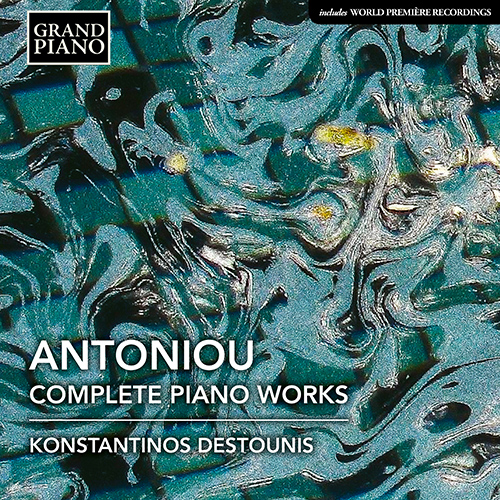
About this Release
“Since my childhood I have been aware of Antoniou’s name, as one of the most significant living Greek composers. Later on, as I became exposed to his piano works, I was immediately taken by their dramatic nature, virtuosity, exploration of sound-colours and stylistic variety. These pieces had never been recorded before, so I felt that it is of vital importance to make them available to a worldwide audience. As a pianist I have been privileged to work closely with the composer himself; this has been the key to unlock the secrets of his music.” — Konstantinos Destounis
ANTONIOU, THEODORE (1935–2018)
Complete Piano Works
- Konstantinos Destounis, piano
Theodore Antoniou is one of Greece’s most celebrated and prolific contemporary composers. His music integrates traditional Greek musical elements within styles ranging from the impressionism of Aquarelle to the virtuoso effects of Entrata, all approached in intuitive ways, and always with an underlying dramatic plot inspired by ancient Greek drama, resulting in the invention of ‘Abstract Programmatic Music.’ This programme was recorded in the presence of the composer, who considers Konstantinos Destounis ‘a phenomenon… a great interpreter of my complete piano works.’
This recording was made on a modern instrument: Steinway, Model D 724
Tracklist
|
1
Entrata (1983) * (00:15:36)
|
|
Aquarelles (1958) (00:13:00 )
|
|
2
No. 1. Adagio espressivo * (00:01:19)
|
|
3
No. 2. Vivo e secco * (00:00:49)
|
|
4
No. 3. Largo mysterioso * (00:01:28)
|
|
5
No. 4. Allegro ritmico * (00:00:57)
|
|
6
No. 5. Andante espressivo * (00:01:45)
|
|
7
No. 6. Allegro brioso * (00:00:49)
|
|
8
No. 7. Andantino calmo * (00:01:16)
|
|
9
No. 8. Presto scherzando * (00:00:50)
|
|
10
No. 9. Largo amoroso * (00:02:36)
|
|
11
No. 10. Allegro barbaro * (00:01:00)
|
|
Piano Sonata, Op. 7 (1959) (00:09:16 )
|
|
12
I. Allegro moderato * (00:02:10)
|
|
13
II. Scherzino * (00:01:55)
|
|
14
III. Adagio * (00:02:33)
|
|
15
IV. Presto * (00:02:27)
|
|
Syllables (1967) (00:05:13 )
|
|
16
No. 1. Parechesis * (00:01:15)
|
|
17
No. 2. Anagramme * (00:00:31)
|
|
18
No. 3. Paragogen * (00:01:10)
|
|
19
No. 4. Epenthesis * (00:00:48)
|
|
20
No. 5. Aphairesis * (00:00:59)
|
|
21
No. 6. Synchysis * (00:00:27)
|
|
Prelude and Toccata (1982) (00:05:09 )
|
|
22
Prelude (00:01:46)
|
|
23
Toccata (00:03:19)
|
|
Inventions and Fugue, Op. 4, No. 1 (1958) (00:07:38 )
|
|
24
Invention No. 1 à 2 voix * (00:01:48)
|
|
25
Invention No. 2 à 3 voix * (00:01:03)
|
|
26
Invention No. 3 à 3 voix * (00:01:50)
|
|
27
Invention No. 4 à 3 voix * (00:01:26)
|
|
28
Fugue * (00:01:21)
|
|
Inventions, Prelude and Fugue, Op. 4, No. 2 (1958) (00:07:43 )
|
|
29
Invention No. 1 à 3 voix * (00:00:59)
|
|
30
Invention No. 2 à 3 voix * (00:01:24)
|
|
31
Prelude * (00:02:47)
|
|
32
Fugue * (00:02:25)
|
|
7 Rhythmic Dances (2000) (00:06:26 )
|
|
33
No. 1. Con brio (00:00:50)
|
|
34
No. 2. Molto ritmico (00:00:29)
|
|
35
No. 3. Presto (00:00:58)
|
|
36
No. 4. Slow (00:00:51)
|
|
37
No. 5. quarter note = 60 (00:01:51)
|
|
38
No. 6. Allegro (00:00:37)
|
|
39
No. 7. Il più presto possibile (00:00:44)
|
|
40
Synaphes (2001) * (00:08:52)
|
The Artist(s)

Konstantinos Destounis (b. 1991 in Athens) is regarded as one of the most prominent Greek artists of his generation. His discography includes the Complete Piano Works by Theodore Antoniou (Grand Piano Records, world première recording), Maurice Ravel (Brilliant Classics), and Naresh Sohal (Toccata Classics, world première recording). He is a Piano Professor at the Department of Music Studies of the Ionian University in Corfu, Greece.
As a soloist he collaborates with numerous orchestras in Greece, Germany, Spain, the UK, Malta and Australia and he performs recitals in international festivals. Springboard to his performing career has been winning many international piano competitions, most notably the Grand Prix Maria Callas in Athens, the Southern Highlands in Canberra and the Bremen European Piano Competition.
After graduating from the Hellenic Conservatory of Athens, the University of Macedonia in Thessaloniki, Greece, and the Mozarteum University of Salzburg, he went on to receive a Doctor of Music degree by the Royal College of Music in London, for his research on Theodore Antoniou’s piano works.
The Composer(s)
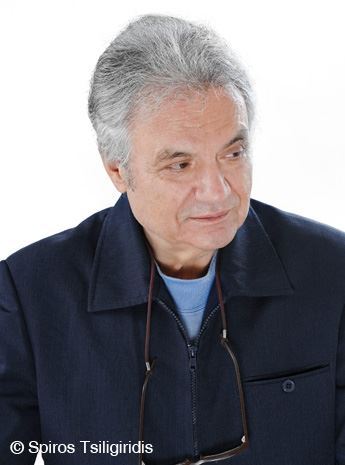 Theodore Antoniou, one of the most eminent and prolific contemporary musicians, had a distinguished career as composer, conductor, and professor of composition at Boston University. His works are numerous and varied in nature, ranging from operas and choral works to chamber music, from film and theatre music to solo instrumental pieces, his scores for theatre and film music alone numbering more than a hundred and fifty compositions.
Theodore Antoniou, one of the most eminent and prolific contemporary musicians, had a distinguished career as composer, conductor, and professor of composition at Boston University. His works are numerous and varied in nature, ranging from operas and choral works to chamber music, from film and theatre music to solo instrumental pieces, his scores for theatre and film music alone numbering more than a hundred and fifty compositions. Reviews
“Destounis’s ardent, vivid and colourful pianism only enhances my positive response to Antoniou’s music, together with the composer’s justifiably enthusiastic endorsement.” – Gramophone
“For this work [Entrata] alone, which recalls Iannis Xenakis in its style, gesture and drama, it is worth buying this fantastic and strongly interpreted CD.” – Piano News

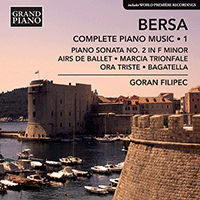
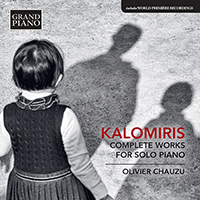
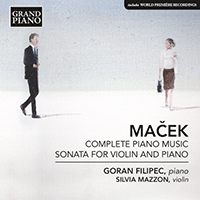
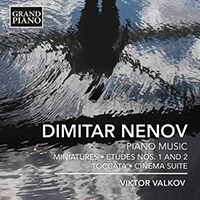
 Grand Piano has gained a reputation for producing high quality recordings of rare keyboard gems. Dedicated to the exploration of undiscovered piano repertoire, the label specialises in complete cycles of piano works by many lesser-known composers, whose output might otherwise have remained unknown and unrecorded.
Grand Piano has gained a reputation for producing high quality recordings of rare keyboard gems. Dedicated to the exploration of undiscovered piano repertoire, the label specialises in complete cycles of piano works by many lesser-known composers, whose output might otherwise have remained unknown and unrecorded.






